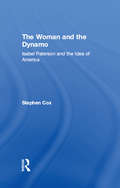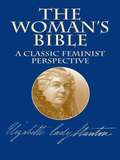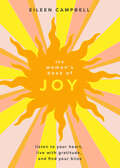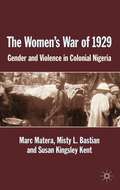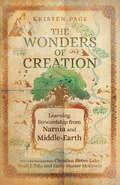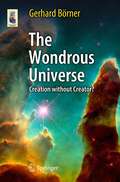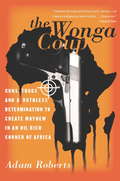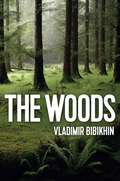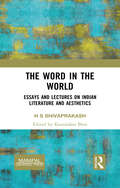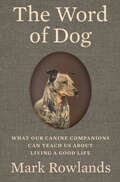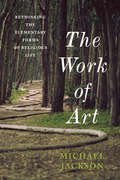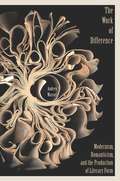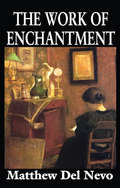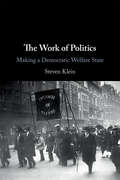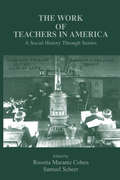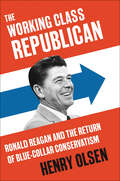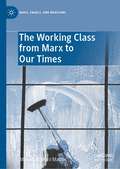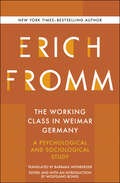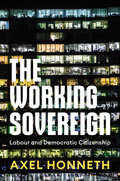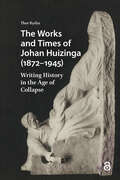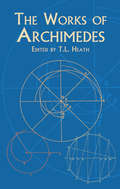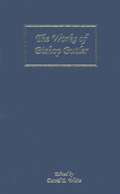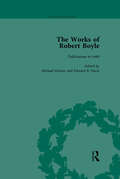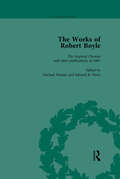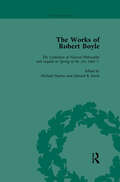- Table View
- List View
The Woman and the Dynamo: Isabel Paterson and the Idea of America
by Stephen CoxNovelist, columnist, cultural critic, political theorist-- Isabel Paterson was one of the most extraordinary personalities of the 1930s, renowned for her incisive wit and her unique interpretation of the American experience. The Woman and the Dynamo is the first biography of a woman who has long been a source of rumor and legend. From interviews, private papers, and her millions of published words, Stephen Cox weaves a narrative that brings Paterson vividly to life.A radical individualist in both theory and practice, Paterson spent her early life on the Western frontier, "lavished" two years on formal education, set a record for high-altitude flight, became a journalist by "accident," and made herself a fearless chronicler and conscience of New York literary life. At the same time, she made a permanent contribution to American political thought.Paterson identified the fundamental issues at stake in the crises of the twentieth century and responded with an original theory of history and political economy. In her view, the individual mind is the dynamo of history, working through the "long circuit" of institutions that maintain and enhance individual liberty; and America is the place where the advanced forms of those institutions were invented and are currently undergoing their severest trial. While other intellectuals derided the American ideal of progress and called for the restraint or abolition of the capitalist system, Paterson demanded a scrupulous application of the "engineering principles" on which American civilization had been built.The Woman and the Dynamo provides one of the few broad and detailed accounts of the origins of the American political Right, emphasizing the special role that women and imaginative writers played in its creation, and posing new questions about what it means to be "left" or "right," "liberal" or "conservative" in America. This will be compelling reading for those interested in twentieth century intellectual history, literature, and politics.
The Woman's Bible: A Classic Feminist Perspective
by Elizabeth Cady StantonBook-by-book examination of the Bible by pioneer in women's rights movement places events in their historical context, interprets passages as both allegory and fact, and compares them with myths of other cultures. In the tradition of radical individualism, Stanton's attack on religious orthodoxy represents a political treatise rather than a scholarly work.
The Woman's Book of Joy: Listen to Your Heart, Live with Gratitude, and Find Your Bliss
by Eileen CampbellExperience Serenity and Hope Daily“The Woman’s Book of Joy is like a comforting friend supporting us in our struggles.” —Mandy Keast-Southall, therapist and yoga teacherWhen you learn to tap into the deep wellspring of joy that is within you, nothing is impossible.A book of joy. Women have a great many challenges to deal with in their lives. Among the most ubiquitous of those challenges is self-care. Too often, we are focused on caring for others and not ourselves. Low self-esteem, anxiety, and depression are all too common when our lives are less fulfilling than they could be. Yet deep within, women have a tremendous spiritual resource―a capacity for real joy that is not dependent on anything external. It is always available, regardless of circumstances.Find your inner spirituality. Many self-help books can lead people into further self-judgement. Instead, The Woman’s Book of Joy encourages and inspires women to care more deeply for themselves and to face life’s challenges with courage and joy. It’s a practical motivational book for accessing inner wisdom, enhancing self-esteem, overcoming sorrow, and deepening relationships.Thinking deeply. The meditations and affirmations in this book will provide you with the opportunity to contemplate a wide range of topics, including:Developing awarenessLetting goBelieving in your dreamsLiving in the nowFinding your true purposePracticing kindnessBeing optimisticTrusting the universeAppreciating life’s blessingsIf you found joy in meditation books and inspirational books for women like I've Been Thinking…, Journey to the Heart, and Each Day a New Beginning, you’ll be encouraged and uplifted by The Woman's Book of Joy.
The Women’s War of 1929
by Marc MateraIn 1929, tens of thousands of south eastern Nigerian women rose up against British authority in what is known as the Women's War. This book brings togther, for the first time, the multiple perspectives of the war's colonized and colonial participants and examines its various actions within a single, gendered analytical frame.
The Wonders of Creation: Learning Stewardship from Narnia and Middle-Earth (Hansen Lectureship Series)
by Kristen PageWhen an author of fiction employs the imagination and sets characters in a new location, they are in a sense creating a world. Might such fictional worlds give us a deeper appreciation for our own?Many readers have found themselves, like the Pevensie children, transported by C. S. Lewis into Narnia, and they have traveled from Lantern Waste to Cair Paravel and the edge of the sea. Thanks to J. R. R. Tolkien, readers have also journeyed with Bilbo, Frodo, and their companions across Middle-earth from the Shire to the Lonely Mountain, the forest of Mirkwood, the mines of Moria, and the very fires of Mount Doom. But as often as we enter these fictional worlds as readers, we eventually return to our world refreshed with sharpened insight.The Wonders of CreationBased on the annual lecture series hosted at Wheaton College's Marion E. Wade Center, volumes in the Hansen Lectureship Series reflect on the imaginative work and lasting influence of seven British authors: Owen Barfield, G. K. Chesterton, C. S. Lewis, George MacDonald, Dorothy L. Sayers, J. R. R. Tolkien, and Charles Williams.
The Wondrous Universe
by Gerhard BörnerThe world as it is viewed from modern physics and cosmology has many strange and unexpected features. Often these are in stark contrast with our everyday experience or our preconceptions, such as the concept of space and time as finite and changeable. Nevertheless it is this strange world which is the fundamental basis of our existence. Therefore modern science also has a few things to say about the age-old questions: Who are we? - Where do we come from? - Where are we going? The author, an experienced scientist and teacher, presents the knowledge that we have about our world for non-experts. He takes us on a journey through cosmology and the quantum world of elementary particles. And he sketches the impact of the insights gained into philosophical assumptions and religious beliefs in these disciplines. In the end he asks the speculative question whether there is something beyond the limits of the natural sciences.
The Wonga Coup: Guns, Thugs, and a Ruthless Determination to Create Mayhem in an Oil-Rich Corner of Africa
by Adam RobertsEquatorial Guinea is a tiny country roughly the size of the state of Maryland. Humid, jungle covered, and rife with unpleasant diseases, natives call it Devil Island. Its president in 2004, Obiang Nguema, had been accused of cannibalism, belief in witchcraft, mass murder, billiondollar corruption, and general rule by terror. With so little to recommend it, why in March 2004 was Equatorial Guinea the target of a group of salty British, South African and Zimbabwean mercenaries, travelling on an American-registered ex-National Guard plane specially adapted for military purposes, that was originally flown to Africa by American pilots? The real motive lay deep below the ocean floor: oil. In The Dogs of War, Frederick Forsyth effectively described an attempt by mercenaries to overthrow the government of Equatorial Guinea - in 1972. And the chain of events surrounding the night of March 7, 2004, is a rare case of life imitating art-or, at least, life imitating a 1970s thriller-in almost uncanny detail. With a cast of characters worthy of a remake of Wild Geese and a plot as mazy as it was unlikely, The Wonga Coup is a tale of venality, overarching vanity and greed whose example speaks to the problems of the entire African continent.
The Woods (New Russian Thought)
by Vladimir BibikhinIn our modern, urbanized societies, our engagement with the natural world often seems distant and superficial. Human life is now far removed from its prehistoric origins, when humans dwelt deep within the forests and depended on them for their survival. In this important book, Vladimir Bibikhin, one of Russia’s most influential twentieth-century philosophers, argues that, although most humans now live far from woods and forests, our existence remains profoundly linked to them. It was Aristotle who first appreciated their primal role, even deriving his notion of ‘matter’w from the Greek words for wood and forest. As timber, the woods may be seen as inanimate material, but at the same time they also constitute a living ecosystem and the source of energy and life. By opening up this duality, the woods are transformed from simple matter to a living environment, serving as a reminder that we belong to the world of biological life to a far greater extent than we usually think. The Woods will be of interest to students and scholars in philosophy and the humanities generally and to anyone concerned with the environment and our relationship to the natural world.
The Word in the World: Essays and Lectures on Indian Literature and Aesthetics
by H S ShivaprakashThe Word in the World is a collection of essays and lectures by H S Shivaprakash, a well-known poet, playwright, and translator. Edited by Kamalakar Bhat, this book brings together Prof Shivaprakash’s interventions in the realm of issues that are entwined with the continuities and discontinuities in the cultural negotiations of India. Distinctively, these are essays on subjects ranging from the nature and significance of medieval works of literature in India to issues arising out of developments in Indian aesthetics. The unfeigned magnitude of this work must be found among students and scholars, who will gain from it a perspective significantly different from the ones available in the prevailing academic discourses, thus indicating a way beyond poststructuralist/postmodernist frameworks. This is a book that will interest a wide variety of readers with its engaging insights and breadth of reference especially because it is written in a comprehensible style. Print edition not for sale in South Asia (India, Sri Lanka, Nepal, Bangladesh, Pakistan and Bhutan)
The Word of Dog: What Our Canine Companions Can Teach Us About Living a Good Life
by Mark RowlandsA heartwarming philosophical meditation on how to live a fulfilling life—inspired by the inherent happiness of dogs. If you have spent any part of your life with a dog, you may have found certain questions popping, unbidden, into your mind: Is my dog living a fulfilled life? Is my dog a good dog? Does my dog love me? Addressing these questions compels you to confront not just your dog’s life but yours as well—to think about what fulfillment, and meaning, in life really is. In The Word of Dog, philosopher Mark Rowlands explores these questions and suggests that in dogs we can see hints—faint, shrouded, but discernible—of what a better way of living might look like. Perhaps none of us can be happy in the way a dog can, but The Word of Dog shows us we could do a lot better than we’re doing simply by listening to the unspoken wisdom our dogs reveal to us every day of their happy, uncomplicated lives.
The Work of Art: Rethinking the Elementary Forms of Religious Life (Insurrections: Critical Studies in Religion, Politics, and Culture)
by Professor Michael D. JacksonHow are we to think of works of art? Rather than treat art as an expression of individual genius, market forces, or aesthetic principles, Michael Jackson focuses on how art effects transformations in our lives. Art opens up transitional, ritual, or utopian spaces that enable us to reconcile inward imperatives and outward constraints, thereby making our lives more manageable and meaningful. Art allows us to strike a balance between being actors and being acted upon. Drawing on his ethnographic fieldwork in Aboriginal Australia and West Africa, as well as insights from psychoanalysis, religious studies, literature, and the philosophy of art, Jackson deploys an extraordinary range of references—from Bruegel to Beuys, Paleolithic art to performance art, Michelangelo to Munch—to explore the symbolic labor whereby human beings make themselves, both individually and socially, out of the environmental, biographical, and physical materials that affect them: a process that connects art with gestation, storytelling, and dreaming and illuminates the elementary forms of religious life.
The Work of Difference: Modernism, Romanticism, and the Production of Literary Form
by Audrey WasserThe Work of Difference addresses a fundamental ontological question: What is literature? And at the heart of this question, it argues, is the problem of the new. How is it that new works or new forms are possible within the rule-governed orders of history, language use, or the social? How are new works in turn recognizable to already-existing institutions? Tracing the relationship between literature and the problem of newness back to a set of concerns first articulated in early German romanticism, this book goes on to mount a critique of romantic tendencies in contemporary criticism in order, ultimately, to develop an original theory of literary production. Along the way, it offers new readings of major modernist novels by Samuel Beckett, Marcel Proust, and Gertrude Stein.
The Work of Enchantment
by Matthew Del NevoThe Work of Enchantment suggests that it is a lack of "enchantment" in rich, developed countries that causes soul-starved Westerners to experience mental (and sometimes physical) illness. Del Nevo argues that this "enchantment" is most often experienced in childhood, but can also be found in adulthood, particularly through art. However, adults must cultivate within themselves the ability to appreciate art by reading, listening, and gazing-activities often misconceived in advanced industrial societies. Del Nevo describes the framework of enchantment and its philosophical and historical roots. He then concentrates on the work of enchantment within literature, considering what enchantment might entail taking the works of Proust, Rilke, and Goethe as examples. Del Nevo shows how a sense of enchantment forms within and between art works, using his literary examples, as well as between the work and the audience. The reader will learn along the way that enchantment may be found in the power of words, as an expression of the desire of the soul, a compliment of melancholy, and in art that points to something beyond itself. Enchantment may be found in many places, ranging from philosophy, religion, and psychology to sociology and culture, but here Del Nevo focuses on literature. His audience is people who are searching for something beyond money or glamour-perhaps the meaning of art and culture. His focus on literary masterpieces such as the Duino Elegies, Remembrance of Things Past, Wilhelm Meister's Journeyman Years, and others will make it of interest to those in cultural studies. Well written and engaging, and accessible to non-specialist readers, this unusual work in philosophy and aesthetics is free of jargon and complicated verbiage. Inspiring and enlivening, it is, in the author's words, "a stirring call to idleness."
The Work of Politics: Making a Democratic Welfare State
by Steven KleinThe Work of Politics advances a new understanding of how democratic social movements work with welfare institutions to challenge structures of domination. Klein develops a novel theory that depicts welfare institutions as “worldly mediators,” or sites of democratic world-making fostering political empowerment and participation within the context of capitalist economic forces. Drawing on the writings of Weber, Arendt, and Habermas, and historical episodes that range from the workers' movement in Bismarck's Germany to post-war Swedish feminism, this book challenges us to rethink the distribution of power in society, as well as the fundamental concerns of democratic theory. Ranging across political theory and intellectual history, The Work of Politics provides a vital contribution to contemporary thinking about the future of the welfare state.
The Work of Teachers in America: A Social History Through Stories
by Rosetta Marantz Cohen Samuel ScheerThis volume presents a complex portrait of the American teacher through a fascinating range of "story" narratives, including fictional short stories, poetry, diaries, letters, ethnographies, and autobiographies. Through these stories, the volume traces the evolution of the teacher and the profession over the course of two centuries -- from the late 1700s to the late 1900s. In depicting the profession over time, the authors include stories by and about both male and female teachers, as well as teachers from a wide range of cultural and ethnic backgrounds, including white, black, Hispanic, Asian-American, immigrant and native-born, and gay and straight. This book offers accessible, comprehensive introductions to both the central ideas associated with each period and to the representative individual stories that are included within it. The volume editors connect each of the parts to earlier and later ones by tracing evolving themes of feminization, teacher activism, conceptions of curriculum and discipline, and issues of multiculturalism. Questions, suggested readings, and activities are offered at the end of each section. Photographs and drawings -- retrieved from state historical archives -- provide telling images of the teacher in each of the four periods.
The Working Class Republican: Ronald Reagan and the Return of Blue-Collar Conservatism
by Henry OlsenIn this sure to be controversial book in the vein of The Forgotten Man, a political analyst argues that conservative icon Ronald Reagan was not an enemy of Franklin Delano Roosevelt and the New Deal, but his true heir and the popular program’s ultimate savior.Conventional political wisdom views the two most consequential presidents of the twentieth-century—FDR and Ronald Reagan—as ideological opposites. FDR is hailed as the champion of big-government progressivism manifested in the New Deal. Reagan is seen as the crusader for conservatism dedicated to small government and free markets. But Henry Olsen argues that this assumption is wrong.In Ronald Reagan: New Deal Republican, Olsen contends that the historical record clearly shows that Franklin Roosevelt and the New Deal itself were more conservative than either Democrats or Republicans believe, and that Ronald Reagan was more progressive than most contemporary Republicans understand. Olsen cuts through political mythology to set the record straight, revealing how Reagan—a longtime Democrat until FDR’s successors lost his vision in the 1960s—saw himself as FDR’s natural heir, carrying forward the basic promises of the New Deal: that every American deserves comfort, dignity, and respect provided they work to the best of their ability. Olsen corrects faulty assumptions driving today’s politics. Conservative Republican political victories over the last thirty years have not been a rejection of the New Deal’s promises, he demonstrates, but rather a representation of the electorate’s desire for their success—which Americans see as fulfilling the vision of the nation’s founding. For the good of all citizens and the GOP, he implores Republicans to once again become a party of "FDR Conservatives"—to rediscover and support the basic elements of FDR (and Reagan’s) vision.
The Working Class from Marx to Our Times (Marx, Engels, and Marxisms)
by Marcelo Badaró MattosThis book reviews Marx's contributions to the debate on the working class. The first part of the work presents the synthesis of the main contributions of Marx and Engels (and 20th century Marxist writers) to the understanding of social classes, the class struggle, and the working class. The remaining parts present exercises of dialogue between Marx's and Marxists’ discussions on the working class, presented in the first part, and empirical elements of class reality today, as well as debates in the social sciences and historiography on the same issues. The thesis defended in the book is simple: the "working class,” also called the "proletariat,” as it appears in the work of Karl Marx, had and has validity as an analytical category for the understanding of social life under capitalism. Nevertheless, Marx’s discussion on the issue is complex and the category “working class” in his approach is wider than many Marxists have presented it.
The Working Class in Weimar Germany: A Psychological and Sociological Study
by Erich Fromm&“The analysis unveils a sociotypology of [the working class] on the eve of the Third Reich, its potential for resistance as well as seduction.&” —Political Psychology Building upon Fromm&’s 1929 lecture &“The Application of Psycho-Analysis to Sociology and Religious Knowledge,&” in which he outlined the basis for a rudimentary but far-reaching attempt at the integration of Freudian psychology with Marxist social theory, this study is an attempt to obtain evidence about the systemic connections between &“psychic make-up&” and social development. Originally an investigation of the social and psychological attitudes of two large groups in Weimar Germany, manual and white-collar workers, a questionnaire was developed to collect data about their opinions, lifestyles, and attitudes—from what books they read and their thoughts on women&’s work to their opinions about the German legal system and the actual distribution of power in the state.The Working Class in Weimar Germany can ultimately help us understand the establishment of fascism after 1933—that despite all the electoral successes of the Weimar Left, its members were not in the position, owning to their character structure, to prevent the victory of National Socialism.
The Working Sovereign: Labour and Democratic Citizenship
by Axel HonnethWhat role does the organisation of labour relations play in the health of a democratic society? Axel Honneth’s major new work is devoted to answering this question. His central thesis is that participation in democratic will formation can only proceed from a transparent and fairly regulated division of labour.The social world of work – where we spend so much of our time – is almost unique in being a space in which we have experiences and learn lessons that we can use to influence the attitudes of a political community. Therefore, by shaping working conditions in a particular way, we have a prime opportunity to foster cooperative forms of behaviour that benefit democracy, both by making mental room for these to flourish and by using the workplace as a rehearsal for democratic interaction in wider society.A job cannot be so tiring that a worker cannot think about political events; a job cannot pay so little that one cannot engage in political activity in his or her free time; a job cannot demand subordination which inhibits deserved criticism of one’s superiors: economic independence, intellectual and physical autonomy, reduction of strain and crushing boredom, sufficient free time, self-respect and the confidence to speak up, and the chance to practice democratic interaction are all things which we must encourage in order to unblock access to democratic participation. Honneth argues that the reality of labour today increasingly undermines this participation – and he sets out the conditions necessary for a reversal of this injustice.Tracking the development of labour conditions since the birth of capitalism, this important book engages with a vital topic that has been neglected in democratic theory. It will be of great interest to students and scholars in philosophy, sociology, politics and the humanities and social sciences generally.
The Works and Times of Johan Huizinga: Writing History in the Age of Collapse (Studies in the History of Knowledge)
by Thor RydinThe lifetime of Johan Huizinga (1872-1945) was marked by dramatic transformations in Europe. Cityscapes, aesthetic codes, social orders, political cultures, international travel and means of warfare developed beyond recognition; entire catalogues of hopes and fears were torn asunder and replaced by new ones during not one but two wars. Amidst all these changes, Huizinga grew to become one of the most famous historians of his time. To this day, his works are treated as monuments in the cultural historical field. This book examines how these transformations and 'experiences of loss' affected and informed Huizinga's historical perspectives. Most centrally, this book contends that Huizinga's historical works helped to accommodate and give meaning to his own experiences of uncertainty and rupture, thus offering him a way of life in turbulent times. This project offers an original and comprehensive analysis of an iconic historian writing in the age of collapse.
The Works of Archimedes: Edited In Modern Notation With Introductory Chapters (Dover Books on Mathematics)
by Archimedes Thomas HeathThe complete works of antiquity's great geometer appear here in a highly accessible English translation by a distinguished scholar. Remarkable for his range of thought and his mastery of treatment, Archimedes addressed such topics as the famous problems of the ratio of the areas of a cylinder and an inscribed sphere; the measurement of a circle; the properties of conoids, spheroids, and spirals; and the quadrature of the parabola. This edition offers an informative introduction with many valuable insights into the ancient mathematician's life and thought as well as the views of his contemporaries. Modern mathematicians, physicists, science historians, and logicians will find this volume a source of timeless fascination.
The Works of Bishop Butler (Rochester Studies in Philosophy)
by Joseph Butler David E. White"Bishop Butler was one of the greatest of the classical Anglican divines. The works of include: Correspondence with Samuel Clarke, Fifteen Sermons Preached at the Rolls Chapel, The Analogy of Religion, Natural and Revealed, to the Constitution and Course of Nature, Six Sermons Preached upon Public Occasions, The Durham Charge, and Fragments. "
The Works of Robert Boyle, Part I Vol 1
by Michael Hunter Edward B DavisIncluding all Robert Boyle's published works, this is the first seven volumes of a 14-volume set. All texts are fully annotated and comprehensively indexed. Works originally in Latin are presented in their contemporary English translations.
The Works of Robert Boyle, Part I Vol 2
by Michael Hunter Edward B DavisIncluding all Robert Boyle's published works, this is the first seven volumes of a 14-volume set. All texts are fully annotated and comprehensively indexed. Works originally in Latin are presented in their contemporary English translations.
The Works of Robert Boyle, Part I Vol 3
by Michael Hunter Edward B DavisIncluding all Robert Boyle's published works, this is the first seven volumes of a 14-volume set. All texts are fully annotated and comprehensively indexed. Works originally in Latin are presented in their contemporary English translations.
